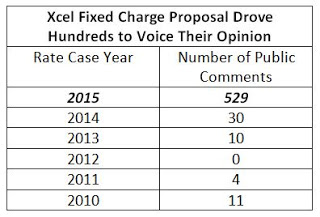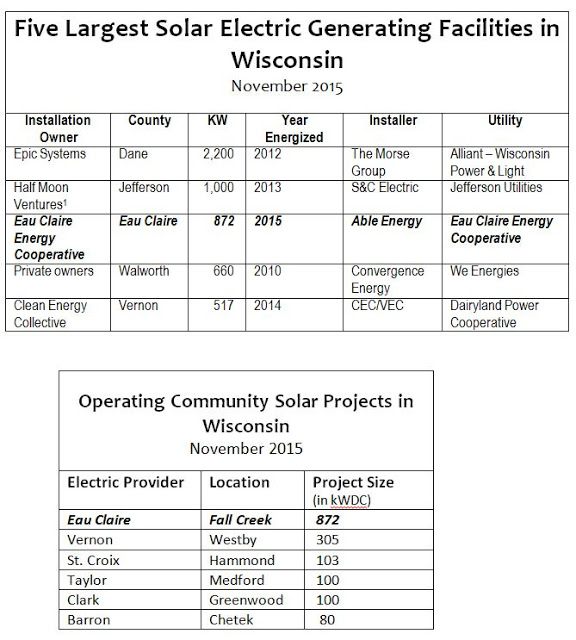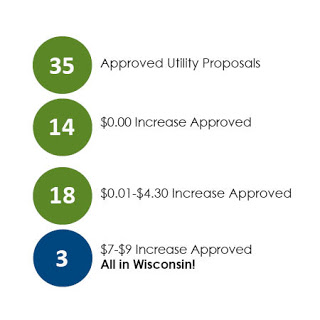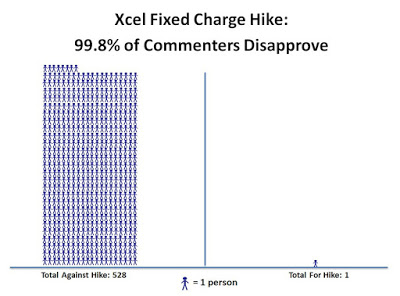
by jboullion | Nov 18, 2015 | Uncategorized
November 18, 2015
More Information
Tyler Huebner, Executive Director
608.255.4044
tyler.huebner@renewwisconsin.org
Record Number of Xcel Energy’s Wisconsin Customers Voice Opposition to Hike in Mandatory Fixed Charge
 99.8% of public commenters (528 out of 529) dislike the fee hike from $8 to $18 per month
99.8% of public commenters (528 out of 529) dislike the fee hike from $8 to $18 per month
Xcel Fixed Charge Proposal Drove Hundreds to Voice Their Opinion
The final tally is in, and it is clear that Xcel Energy’s Wisconsin affiliate, based in Eau Claire, has proposed an incredibly unpopular change in how it wishes to bill customers going forward.
Following the footsteps of other Wisconsin utilities, Xcel’s Wisconsin utility has proposed to raise its monthly “fixed charge,” which every residential and small business
customer pays before using any electricity at all, from $8 to $18 per
month.
In total, 529 public comments were filed, a seventeen-fold increase in public participation over any Xcel rate case in the previous five years. RENEW Wisconsin’s review shows that 528 (all but one commenter) disapproved of Xcel’s proposed hike in fixed charges.
“It is clear that Xcel’s customers overwhelmingly oppose this hike in mandatory fixed charges. These high fixed charges are a Robin Hood in reverse scheme: the lowest users of electricity end up paying substantially more, while high users of electricity see dollar savings,” said Tyler Huebner, RENEW Wisconsin’s Executive Director.
Public comments were made through the Public Service Commission’s online system, in person at the public hearing on September 16th in Menomonie, or through written mail.
In the public comments, a wide variety of concerns were aired. Senior citizens, fixed-income, and low-income advocates worry that they will have to choose between paying for electricity, food, or medicine. Energy conservation and renewable energy advocates oppose paying high unavoidable fees while seeing the variable energy rate decrease, making the payback longer than it should be for energy- and money-saving investments.
These perspectives can be seen from the selection of public comments included below:
“I am a senior and living on a rigidly fixed income and will not be able to survive in my home if utility costs continue to inflate.” — Cynthia Martinson, Washburn WI
“While the rest of the Country is moving forward, promoting clean energy, Wisconsin utilities are moving us backwards with proposals that undermine clean energy and energy efficiency. If approved, Xcel’s mandatory fixed charge would increase to $18 per month, up from $8 today–a 125% increase, and Xcel’s Wisconsin customers would be facing much higher bills than their neighbors in Minnesota.” — League of Women Voters of Ashland & Bayfield Counties
“I find it outrageous that in every bill from Xcel there is an insert with information on how to reduce my electricity use so that I can “save” money but at the same time, the mandatory fixed charge will be increased–probably to make up for any money Xcel loses by my conservation efforts.” –Judy Blackstone, Eau Claire
“As an Xcel Energy shareholder, I urge the Public Service Commission NOT to approve the proposed 125% mandatory fixed charge rate increase. This steep, unfair and unnecessary increase will be too much to bear for the poorest and most vulnerable among us; those with low incomes and the elderly.” -Dan Stickler, Eau Claire
“Where is that extra $10.00 going to come from? It will come from the food budget- people will go hungry one more night per week; it will come from the medication budget- people who take prescriptions will cut pills in half, or take the medications every other day.” -Joanne Rudrud, Altoona
“I am thankful the MN Public Service Commission rejected the 19% increase here, and implore the WI Public Service Commission to reject the 125% increase across the border.” –Debra Bourne, Minneapolis
“The fixed charge increase XCEL is asking for is unwarranted, totally against the utilities’ best interests, [and] extremely unfair to the public.”– William E. Bastian, La Crosse
“Currently 41% of all student enrolled in our schools are using free or reduced lunch. Some schools, like Longfellow Elementary, are as high as 74%. These are the people who are going to be hit the most by any increase in rates. Keep in mind, these are just household using the assistance, it doesn`t count households living with financial difficulty who choose, for whatever reason, not to take the assistance.” -Chue Xiong, Eau Claire School Board Commissioner.
Previous RENEW Wisconsin analysis also shows that Wisconsin is an outlier on this issue: no other state has approved such dramatic hikes in monthly fixed charges. Learn more at http://www.renewwisconsin-blog.org/2015/10/robin-hood-in-reverse-is-back-wps.html.
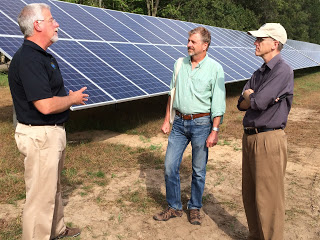
by jboullion | Nov 17, 2015 | Community Solar, Solar, Uncategorized
With the flip of a switch, Fall Creek-based Eau Claire Energy Cooperative (ECEC) now owns and operates Wisconsin’s newest and largest Community Solar project. Consisting of 2,816 panels with a rated capacity of 872 kilowatts (DC), the array will produce approximately 900,000 kilowatt-hours a year, roughly the equivalent of what 90 households would consume in a year.
For the moment at least, it is the third largest solar array in Wisconsin (see table below).
River Falls-based Able Energy Company constructed ECEC’s system. Later this year, Able will commence construction on a 250 kW solar array in Minnesota for People’s Energy Cooperative.
“Eau Claire Energy’s project makes a statement on solar energy that couldn’t be clearer,” said Tyler Huebner, executive director of RENEW Wisconsin, a renewable energy advocacy organization headquartered in Madison. “If you’re searching for a utility project that delivers clean energy and long-term savings to its subscribers while creating good-paying jobs with in-state businesses, you’ll find an excellent example in Fall Creek.”
“Solar energy is here to stay and we encourage other electric providers to embrace that reality,” Huebner said.
Under a typical community solar project, electricity customers help finance the building of a large project through an up-front subscription fee that is paid back in full (with a modest return) through monthly on-bill credits. A centralized solar array enables all utility customers, including those who rent or are lacking sufficient solar exposure, to support the expansion of solar generation in their community.
Since early 2014, six Wisconsin electric cooperatives have built and energized solar gardens totaling more than 1.5 MW (see table below). For information on community solar activity in Wisconsin, visit RENEW’s web page at http://renewwisconsin.org/action/CommunitySolar.htm.

by jboullion | Oct 30, 2015 | Uncategorized
Today, Dane County Circuit Court Judge Peter Anderson overturned a key ruling that would have led to We Energies electric customers who generate some of their own power having to pay extra fees back to the utility. RENEW Wisconsin and The Alliance for Solar Choice joined together to challenge the Public Service Commission (PSC) ruling on this fee.
 |
Milwaukee solar installers putting
in a rooftop solar system, via energy.gov. |
“The judge today determined that there was not sufficient evidence to support the decision made by the Public Service Commission, and ruled that he is vacating these fees,” said Tyler Huebner, RENEW Wisconsin Executive Director.
In Fall of 2014, We Energies proposed that a customer who creates some of their own power to reduce their usage of electricity would be forced to pay an additional fee of $3.79 per kilowatt of power capacity per month. For a typical 5 kilowatt solar installation on a home, that would have amounted to about $19 a month, or $227 per year, and a 27% reduction in energy bill savings. Customers using biogas or hydropower would have faced a higher fee, $8.60 per kilowatt of power capacity.
The Public Service Commission, Wisconsin’s state agency that regulates utilities like We Energies, approved the proposal in December 2014. They became just the second regulatory agency in the country to do so, after Arizona, where a small $5 per month fee was approved on solar customers.
The fees were set to begin in January 2016, but will not go into effect.
The Judge asked the parties (TASC, RENEW, We Energies, and the PSC) to draft an order consistent with his verbal statement.
The Judge’s decision is the third time in two years that PSC decisions governing customer-owned renewable generation have been overruled by the Dane County Circuit Court.
“Renewable energy is good for Wisconsin. When customers produce their own power, it increases our energy independence. When customers produce their own power, it increases energy security. A growing renewable energy industry will create jobs and bring investment to the state. Renewable energy is growing in states all over the country, and states right next door to us like Iowa, Michigan, and Minnesota, and hopefully this decision will enable more of We Energies customers to take advantage of all the benefits of clean energy,” concluded RENEW’s Huebner.
RENEW Wisconsin leads and accelerates the transformation to Wisconsin’s renewable energy future through advocacy, education, and collaboration. More information on RENEW’s web site at www.renewwisconsin.org.
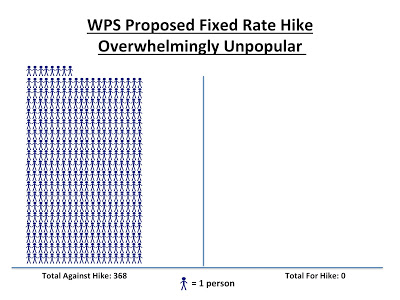
by jboullion | Oct 20, 2015 | Uncategorized
For immediate release
October 20, 2015
More
information
Tyler Huebner, Executive Director
Nearly 370 people made public comments. None support
this policy change.
Wisconsin Public Service Corporation (WPS), a utility based in Green
Bay, proposed in May to further increase the mandatory fixed charge for
electricity that each residential customer has to pay each month.
In 2014, WPS was approved by state regulators
to raise this fee from $10.40 to $19, and they are now proposing to further
hike the fee to $25 per month.
In total, this represents a 140% increase in the monthly mandatory “fixed charge”
that each customer would have to pay.

Nearly 370 individuals spoke out against this proposal. Of
significant note,
not a single individual or organization who took the time to make a
public comment is in support of these higher mandatory fees. Public comments were accepted online
electronically, in paper format, and taken at a public hearing on September 9th
in De Pere.
“It is clear that Wisconsinites overwhelmingly oppose WPS’ continued attempts
to raise these mandatory fixed charges. These
high fixed charges are a Robin Hood in reverse scheme: the lowest users of electricity end up paying
substantially more, while high users of electricity get a windfall,” said Tyler
Huebner, RENEW Wisconsin’s Executive Director.
In the public
comments, a wide variety of concerns were aired, from seniors, low-income,
fixed-income, energy conservation, and renewable energy perspectives. These
perspectives can be seen from sample comments included below:
– “The senior community often live on the edge. With expenses for food, rent,
medications & utilities constantly rising, saving money to pay these bills
is extremely difficult. It is impossible
to save on utilities when the base rate keeps rising. Careful usage does
not work in this case. Please be aware of this as you decide what to do with
the current rates. We could sit in the dark & our rates would still
increase.” – Laura Frost, Wausau
– “
Even if I turn
down my heat, turn off my lights, and convert to solar or wind power I will be
charged the same amount as someone who doesn’t make any of those efforts.”
– Janis Schmitz, Brussels, WI
– “Every year St. Vincent de Paul runs out of money in their budget that they
have set aside for energy assistance… If
we continue to raise the mandatory rates like this, these organizations that
try to help the poor and the elderly are just going to run out of money,
and they’re going to be left behind without heat.” – Jackie Thiry, Green Bay
– “What about all the people on fixed
incomes? They often have to forego medications to pay utility bills.” – Geri Deprey, Green Bay
– “The increase in the mandatory
customer charge and the modest reduction in energy rates hit low electricity
users harder than high electricity users….
It is contrary to state energy policy. Wisconsin`s energy priority law
states that to the extent feasible and cost-effective, electricity needs should
be met first with energy efficiency and second with non-combustible renewable
energy like solar. By reducing one`s savings from pursuing conservation and
clean energy alternatives, this billing design encourages increased consumption
of fossil fuels.” – Christine Morrissey, Appleton
– “I am living on a fixed income. I am 73 years old. I am already struggling to
keep up with my rent, day to day needs and my electricity as it now stands. You will create a very uncomfortable and no
win situation for me if I have to keep coming up with more money. I am
required to keep my electric current to continue living in my apartment. I have
no where else to go if I get evicted.” – Judith Specht, Green Bay
– “My family lives on my disability payment alone, as my wife must spend the
majority of her time tending to me. Anything
that impacts our budget has an extraordinary effect on our lives, literally
taking food from our table. Please consider all of the families like ours
that will be effected by this proposed rate hike, if it is granted. Thank You.”
–Scott Horton, Oshkosh
“I believe that we are paying enough. Period. I live
and work in a rural area. Many of my students struggle for basic needs. How can
you justify another raise in our rates? When is enough–enough?
We are talking basic necessities — we
need light, we need heat. Our incomes are not keeping pace with the increases
that are forced upon us. Please, stop.”- Jann Sharpe, Oconto
Analysis by RENEW Wisconsin shows Wisconsin is an outlier on this issue. “Although 35 utilities across 19 different
states have proposed increases in mandatory fixed fees in the past two years,
only in Wisconsin have large hikes been granted. Fourteen utilities have been denied entirely,
while eighteen have been granted small increases, from $0.10 to $4.30 a month
for customers,” concluded RENEW’s Tyler Huebner.
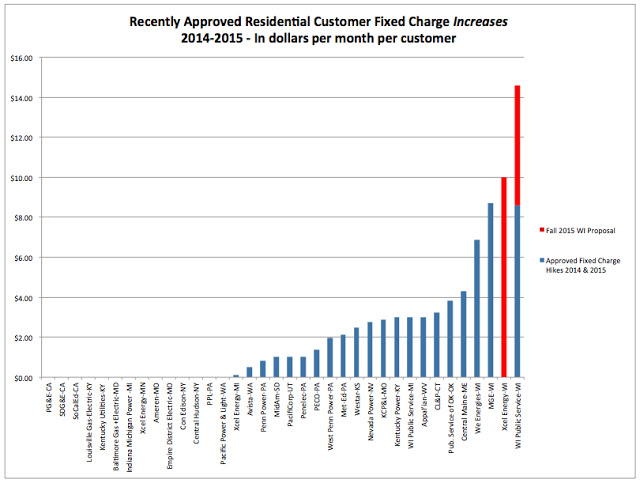
The graphic above depicts 35 investor-owned
utilities which have requested increases to the monthly fixed charge each
customer must pay in 2014 or 2015. The
14 utilities on the left-hand side were completely denied their request to
increase the charge. The middle 18
utilities were granted increases from $0.10 to $4.30 per month. To the right, the three largest blue bars,
all for Wisconsin utilities, show higher fixed charge increases of $6/month and
more. The two red bars depict 2015
proposals from Wisconsin utilities.
-END-
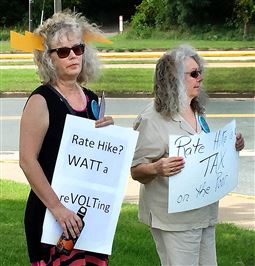
by jboullion | Oct 5, 2015 | Uncategorized
 |
| Photo by Pamela Powers of the Eau Claire Leader Telegram |
The Eau Claire Leader-Telegram featured an excellent editorial on Xcel Energy’s proposal to increase mandatory monthly customer charges, claiming that the proposal harms “frugality” by giving customers less control over their monthly bill, and also quotes RENEW’s Michael Vickerman.
See the full article here.

by jboullion | Oct 1, 2015 | Uncategorized
 |
| Vernon Electric Cooperative Community Solar |
Madison Gas & Electric filed an application this week to launch a pilot program, which, if approved, would result in the construction of a 500-kilowatt array atop the
Middleton Municipal Operations Center under construction. Under the
proposal, MG&E will market the output from this array in 250 watt
increments to residential customers, up to a maximum of 3 kW per
household. Participating customers would pay a one-time up-front payment
to MG&E and then receive, at a partially fixed price over a 25-year
period, output up to one-half of their annual electric usage. Under
current rates, the price of electricity received through the Community
Solar array would be close to the levels that Green Power Tomorrow
customers pay for their renewable electricity.
As was done with other utility community solar initiatives,
RENEW plans to submit comments on
 |
| Eau Claire Electric Cooperative Community Solar Array |
this pilot program to the Public Service Commission. The agency’s decision should occur before the end of October—check back with us to find out if the PSC approved MGE’s Community Solar tariff. For more information on this proposal, you can review the application here. The Milwaukee Journal Sentinel wrote a short article on MG&E’s proposal, which can be accessed here.

 99.8% of public commenters (528 out of 529) dislike the fee hike from $8 to $18 per month
99.8% of public commenters (528 out of 529) dislike the fee hike from $8 to $18 per month
